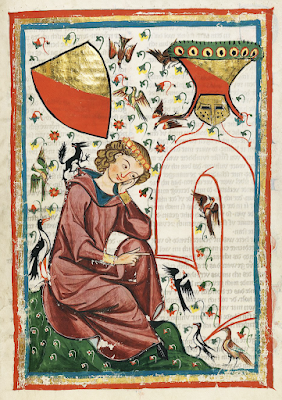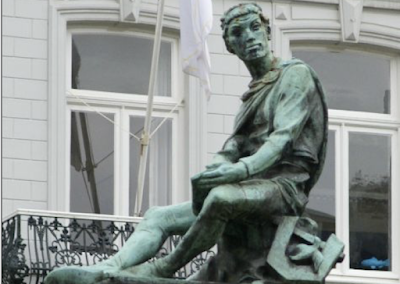The justified defence of the female sex
against the unfounded accusation of men
composed on the occasion when
His Royal Majesty’s
loyal subject Lieutenant Colonel of a Cavalry
Regiment in Pomerania/
Honourable COUNT/
Count AXEL LJLLJE/
was united in marriage with
The honourable LADY/
Miss AGNETA WREDE/
in Stockholm
on 27th of June Anno 1693.
YOU Calliope once convinced me long ago/
Though scarcely to my gain/ to become known so widely/
By placing your lute in my hands to help and guide me
So everywhere fame of my rhyming skills might grow.
Though, as I well recall/fine hours there did abound
When in my youth you and your Sisters I neglected/
To what I would most cherish felt quite disaffected/
Which was to please you and establish solid ground.
A ground/on paper founded/on which you are sure/
(All envy, threat of bliss/ yea death itself disdaining/
The ravages of time for evermore restraining)
A lasting name and memory can rest secure.
All this I shall not deal with, and quite rightly so/
Goddess, the value of your reasons now discerning/
All your advice approve, agree with those of learning/
If just this once my pen can cause some joyfulness to flow.
To write this very eve a worthy wedding song/
Whose source from the Castalian Spring is fully welling/
Whose syllables and words are suitable and telling/
Whose meaning is succinct/ its rhyme unforced and strong.
Quite few/ I know it well!/ with such a gift are blessed/
If I though am to keep the promise I have stated/
Then just this once let me see something fine created/
And mongst those sparsely sown perhaps then be assessed.
Not for my own sake but so joy at this fine feast/
Where branches of two noble trees have been united
In heaven and on all the earth and troth been plighted/
May by a poem fit for heroes be increased.
A poem where of Astrild’s tricks there is no sign/
To which end help me choose a subject quite specific/
As of events and dates I could be too prolific/
Praise Lilier’s courage and the bride’s ancestral line.
But since the world is well acquainted with this sphere/
And their ancestral lines outshine all reputation/
I will instead attempt to find for my oration
What less will tax the mind/ be pleasing to the ear.
I find it worth the effort and a fitting act/
If through good reasoning we could refute completely
And prove quite false what many claim so indiscreetly/
That women love the best/but most conceal the fact.
I found some days ago a shortish written note/
Though much more than enough to set my mind disputing/
And make me feel the view expressed there needs confuting
Though in another tongue than that in which I quote.
I swear he says at first I always had believed/
Yes, truly was convinced that I was right in thinking
That men with passions burn,/ with women from them shrinking/
That we from nature stronger urges have received.
In spite of this, I ask myself increasingly/
To what extent the weaker sex feels passions strongly/
Perhaps is far superior, assessed quite wrongly/
As what now follows seems/to show that this may be.
For scarcely have they reached their twelfth or thirteenth year/
Than they with secret thoughts of love plague their existence/
Choose one as friend and one as husband with persistence.
But should it so transpire that twenty years draw near/
God help us, now we hear them counting every day
They long/ yearn/ pray/ their time on scheming is expended/
Though if they are not loved/ in secret are offended/
As if consumed by ash-topped fire they waste away.
I am not someone though who would apportion blame/
Or any unjust sentence on the others tender/
What worth would the poor sex have were there no male gender?
No wonder that they yearn so highly is my claim.
And what else jokingly, unjustly he professed/
I for the sake of brevity his words will ration/
Though that our sex is skilled in other things than passion
He offers ample proof of/ all admit when pressed
What an unruly guest/what torment love inspires
Which on arrival reason quite subdues, confuses
The mind and senses, weakens judgment, quite bemuses/
Leads will itself astray and furthers its desires.
Is this then women’s work? Of weakness a true sign?
Do maidens know at once how they can tame such tyrants?
And to conceal such fire? This nothing seems to warrant/
Were someone to convince such was their design
He must perforce admit/though this he truly hates!
That such weak creatures/can display a great acuteness
Yes, often outdo men in showing more astuteness/
For to do otherwise than what the heart dictates
Is quite some feat and certainly requires much more
Than one would think us capable of overcoming/
Of cloaking it in shades opposed to those forthcoming/
Despite the stronger sex oft boasts much on that score?
You honourable pair who on this day intend
Your pure love to the whole world now to be maintaining/
You best of all about yourselves could try explaining
Who rightly can avow this/ I or my loved friend.
You/ Mister Bridegroom/ should be highly satisfied
If in your noble bride you find the flame of yearning
That so consumes your heart/ for if you share that burning/
The match is faultless and your knot of bliss is tied.
To see the original poem, go to here.
The Castalian Spring lies close to the Oracle of Delphi. In ancient times, it was believed that water from this spring could cleanse the souls of the visitors to the popular Temple of Apollo, located only 500 metres away.
A Swedish synonym for Amor is Astrild, coined by the writer Georg Stiernhielm. It is made up of the Icelandic words ást (love) and ild (fire). The name became highly popular in Swedish literature in the 17th and 18th centuries (e.g. Bellman).














